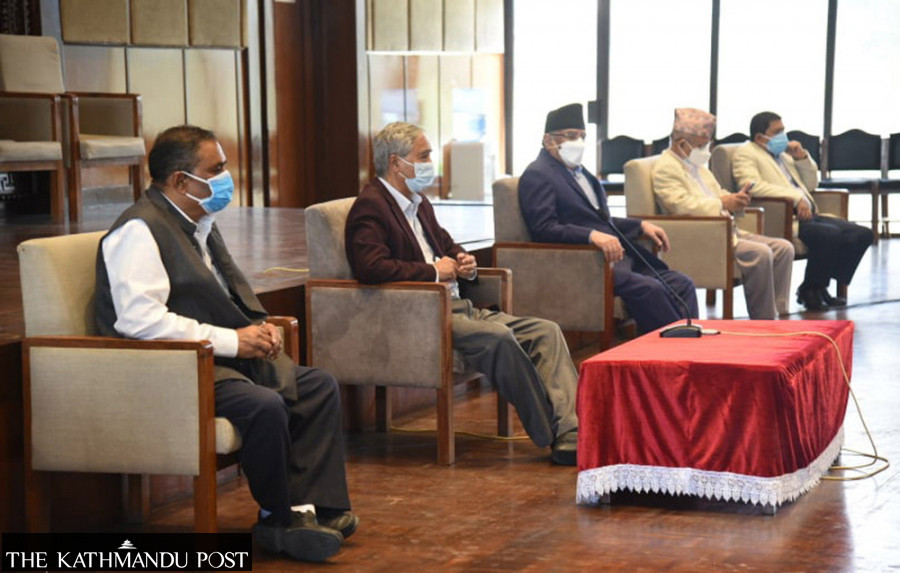National
Intervention in judicial crisis unlikely as political parties are divided
Ruling alliance has not yet discussed the controversy and Deuba is leaving on a four-day visit to the UK today.
Anil Giri
As the crisis deepens in the Supreme Court, political fraternity is sharply divided on whether the political parties should intervene. And the crisis is only likely to prolong, as Prime Minister Sher Bahadur Deuba is set to leave for the United Kingdom on Friday to attend the UN Climate Summit being held in Glasgow on 1-2 November.
According to the Ministry of Foreign Affairs, Prime Minister Deuba is leading a Nepali delegation to the World Leaders Summit of the 26th Conference of Parties to the United Nations Framework Convention on Climate Change, and will be returning home on November 4.
Sources close to the prime minister said that he has consulted party leaders and ministers on how to seek a way out of the present crisis in the Supreme Court, and sent a message to Chief Justice Rana to take the legal fraternity’s concerns and complaints seriously. Rana has refused the call from justices, Bar associations and former chief justices to resign and said that he would rather face any possible action, which could mean an impeachment process in Parliament.
Some advisers to Prime Minister Deuba have suggested that he form a high-level judicial committee to probe the allegations that judges and lawyers have brought against Chief Justice Rana before taking any decision.
While Prime Minister Deuba had spoken about convening a meeting of the ruling alliance to defuse the tension in the Supreme Court, the meeting could not take place on Wednesday and Thursday.
“We were supposed to meet and discuss the ongoing judicial crisis on Wednesday but some leaders were out of the Capital,” Baburam Bhattarai, a senior leader of the Janata Samajbadi Party and former prime minister told the Post.
With Deuba leaving the country on Friday, there appears no hope of finding a solution to the judicial crisis through political intervention until Deuba returns home.
Meanwhile, the prospect of parties registering an impeachment motion against Rana in the House is also fading away, as the government has prorogued the House and the political parties are divided on whether to impeach him.
Justices, Nepal Bar Association, Supreme Court Bar Association, former chief justices and networks of judges want Rana to quit. Joining their call are a small group of leaders from the ruling alliance—Nepali Congress, CPN (Maoist Center), CPN (Unified Socialist), Janata Samajbadi Party and Rastriya Janamorcha. Some political leaders say that it is up to the judiciary to make the call.
The main opposition, CPN-UML, has spoken in support of the beleaguered chief justice though.
“If Rana has to quit, the other four Supreme Court justices who delivered the verdict on House restoration should also resign,” UML chief and former prime minister KP Oli said on Tuesday.
Oli claimed all five justices of the Constitutional Bench were wrong to overturn his decision to dissolve the House. The bench on July 12 observed that Oli’s decision to dissolve the House was “unconstitutional and undemocratic.”
The ruling party, Nepali Congress, meanwhile, appears reluctant to interfere in the Supreme Court’s affairs.
There is nothing to be done by the political parties in the ongoing dispute in the court, Nepali Congress Joint General Secretary Prakash Sharan Mahat said.
“We don’t have any right to intervene in the judiciary. If the Supreme Court violates the constitution or takes decisions against the constitution, then the political leadership discusses possible remedies. But the nature of the current dispute in the judiciary is such that the solution should be sought by the judiciary itself, not by the political leadership,” said Mahat.
On Thursday, a senior ruling alliance leader and chairman of the CPN (Unified Socialist), Madhav Kumar Nepal, also ruled out the possibility of impeaching the chief justice.
Speaking to journalists in Dhangadhi, Nepal said there has not been any discussion on impeachment either in his party or the ruling alliance. Nepal also criticised Oli’s statement that all five justices who issued the House restoration verdict should resign.
“Oli is intervening in court matters. The judges delivered historic verdicts in favour of democracy and the constitution. Oli is behind the mess in the judiciary,” said Nepal.
A member of CPN (Maoist Centre) Chairman Pushpa Kamal Dahal’s secretariat also said the alliance has not discussed the controversy surrounding the chief justice.
“Dahal is in Chitwan and he is returning to the Capital on Friday afternoon, and Prime Minister Deuba is leaving for the United Kingdom on Friday morning so the alliance can’t discuss or hold consultations on the crisis,” the member told the Post.
A senior Maoist Centre leader said: “If we see from the statements of the top four leaders Deuba, Oli, Dahal and Nepal, that they are not interested in initiating impeachment proceedings against Rana. If the chief justice doesn’t deserve impeachment, then why should he quit?”
“The justices who are boycotting the Supreme Court benches are the ones who are under pressure to return to work, and the lawyers are also divided on the dispute. Amid such divisions, how can the ruling alliance take an unilateral decision and put pressure on the chief justice to step down?”
But there are also voices inside the ruling alliance calling for resolution to the crisis without any delay.
“The judiciary itself should seek a remedy to the problem. But if it is unable to do so, then it is the parliament’s responsibility to find a solution,” Janata Samajbadi Party leader Bhattarai told the Post.




 19.12°C Kathmandu
19.12°C Kathmandu














